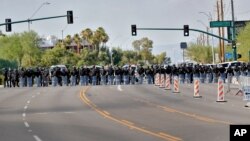Police broke up a protest Tuesday outside a church where President Donald Trump was nearing the end of a speech to supporters.
Authorities said they declared the protest of several hundred people to be an unlawful assembly when two demonstrators swung at two officers in separate incidents, and others threw objects. No arrests were made.
Two groups of protesters had merged into one and demonstrated peacefully for hours as police, most in plainclothes, stood watch.
Tension grew as officers in riot gear arrived to stand between demonstrators and the path of Trump's motorcade. Phoenix Police Sgt. Ann Justus said some protesters had moved outside a designated "free speech zone" and into an area protected for the motorcade.
Video from a protester, Jared Forster, showed a line of people chanting and yelling at a line of police in riot gear as an officer on a loudspeaker told people to step back. The video shows one demonstrator pushing on an officer's shield with his arm and the officer grabbing him around the neck in response.
Authorities used flash bangs, pepper balls and "a burst of pepper spray," Justus said.
One of the protesters, Bethne Stewart of Phoenix, said she was hit with mace or some other eye irritant.
"We've been peaceful all day," Stewart said. "We've been loud, of course, that's our right. But the police have been dogging us, harassing us."
Most demonstrators promptly left, and organizers using bullhorns urged others to do so as well. They cleaned up their trash as they dispersed.
Inside Trump's event, Arizona elected officials were among the few spectators observing Phoenix's order for people to cover their faces while in public. Gov. Doug Ducey, who last week gave mayors the authority to impose mask mandates amid skyrocketing COVID-19 cases, wore a mask with an Arizona flag. Sen. Martha McSally and Reps. Paul Gosar and Debbie Lesko also wore masks.
About 3,000 people were crowded inside the Dream City Church to hear the president speak at a "Students for Trump" event.
Fans began lining up hours before they were allowed inside, most flouting the city's order to wear masks in public to stop the spread of COVID-19. Phoenix Mayor Kate Gallego had said the policy would not be enforced, noting the city was focused on educating people not ticketing them.
Some said they felt the threat of the virus was overblown or that they were healthy enough to survive it.
"It's not anything to really concern myself about," said Bryon McComb, who was decked out in Trump gear and said he's seen the president speak several times in Phoenix and Houston.
Inside, seats filled up shortly before Trump arrived, but late-arriving supporters were surprised to find they could get inside. Unlike many Trump events before the pandemic struck, there was not a large crowd gathered outside.
Pam Neff, 64, of Phoenix brought a mask and accepted a face shield that someone handed her. She was a little concerned about the virus but felt it was important to show her support for Trump, she said.
"I just wanted to stand for him, and I think my presence is dong that," Neff said.
Under blazing heat that reached 107 degrees (41.6 Celsius) in the afternoon, several hundred Trump critics gathered outside, shouting and waving signs. A group chanting "Black Lives Matter" marched down busy Cave Creek Road, escorted by police in plain clothes, and met up with others protesting in front of the entrance to the church property.
Chris Hanlon, a 49-year-old Arizona State University professor, said he was doubtful Trump would listen to the protesters' message, but he was hopeful others would hear it.
"I hope that demonstrations like this convince decent, moral Americans who care about one another that they're not alone, and in fact they're in the majority," Hanlon said.
Hanlon, who wore a mask, said he was taking a risk by joining a crowded protest, but "this is not a frivolous reason to take that risk." He believes the protest is less risky than Trump's indoor rally in Tulsa, Oklahoma, last weekend because demonstrators in Phoenix were outdoors and mostly masked.
Trump arrived in Phoenix following a stop in San Luis, outside Yuma, to look at the U.S.-Mexico border wall that he's championed.
Arizona, in particular, is seeing disturbing trends in several virus benchmarks, including the percentage of tests that prove positive for the virus. The state's positive test rate is at a seven-day average of 20.4%, well above the national average of 8.4%. When the positive test rate rises, it means that an outbreak is worsening — not just that more people are getting tested.
Ducey lifted his stay-home order in May but said social distancing should be maintained. He carefully avoided criticizing people who violated the recommendations and declined to order people to wear masks. But seeing worrying trends, he reversed his position last week and allowed cities and counties to impose their own mask mandates. Most, including Phoenix and Yuma — and the counties where they are located — have issued such orders.
Still, Ducey said he would not intervene to discourage Trump's rally.
"These are voluntary events and people will voluntarily make the decision," Ducey said at a news conference last week. "We're going to protect people's rights to assemble in an election year."
Police Break Up Protest Outside Trump Rally in Phoenix




